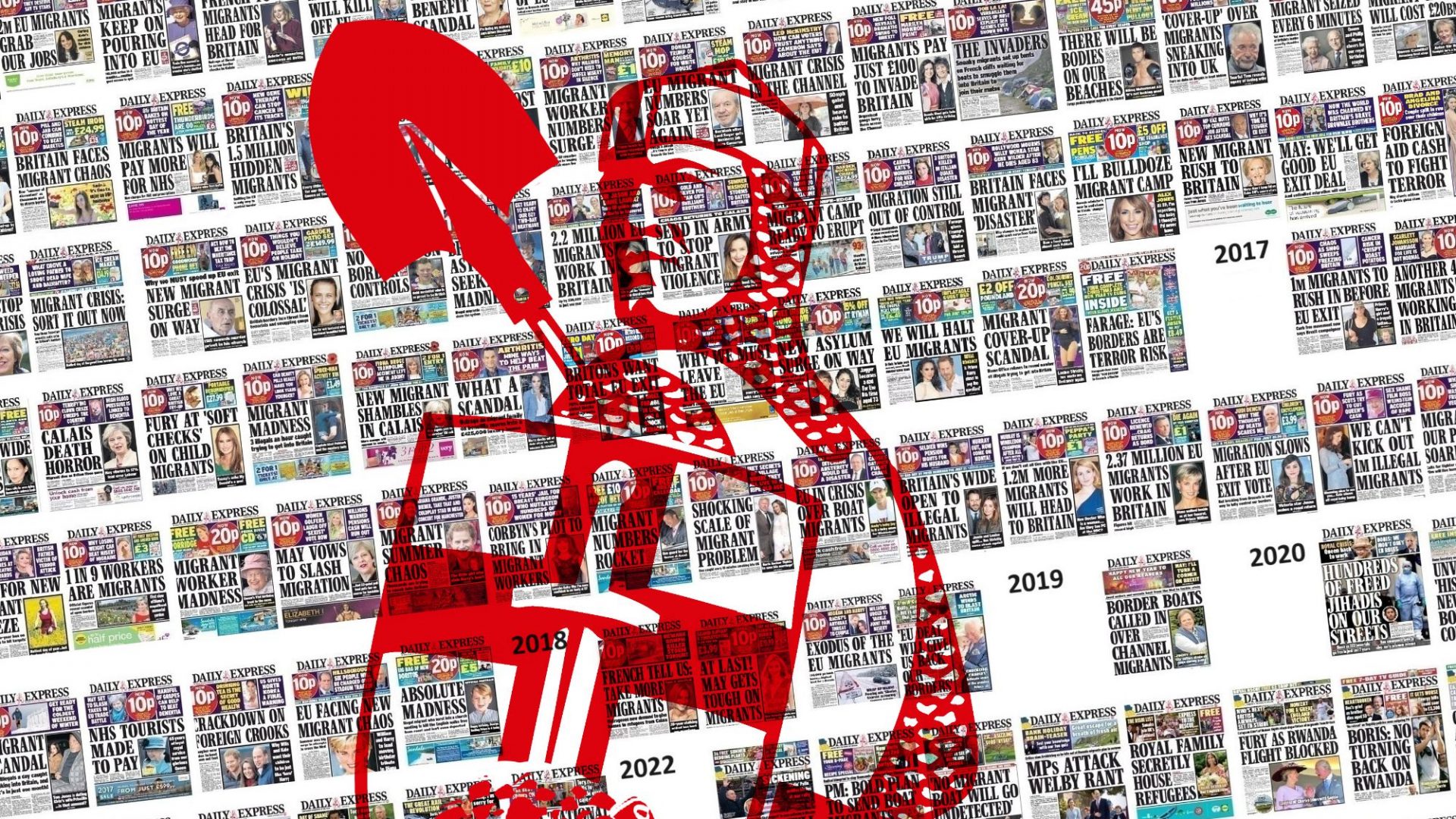Is it the job of a national newspaper editor to give readers what they want?
Well, obviously! It’s any business’s job to give customers what they want. M&S puts salmon en croute on the shelves and floral wrapover dresses on the hangers because people buy them. If they didn’t, they’d withdraw them and sell something else.
And newspapers are businesses: in retail terms, the readers are the customer, the editor the chief buyer.
But what if the customers are turning away? You’ve tried offering something different and they still go elsewhere. Do you retreat to the niche sellers in the hope of keeping the few who remain loyal? Do you cram your rails with 20 wrapover dresses and stock your freezers with 15 different salmon recipes?
This is what the Express seems to be doing. And it won’t save it.
In 2018, Richard Desmond sold the Express titles to Trinity Mirror, owners of the Mirror and many local papers. The company changed its name to Reach, inevitably looked for “synergies”, and installed new editors. Gary Jones, who said he was a lifelong Labour voter, took the chair at the Conservative Express. He succeeded Hugh Whittow, who had – with some justification – claimed to have been the architect of Brexit.
He had campaigned for years for an in-out referendum, with the backing of nearly 400,000 readers who took the trouble to fill in a coupon and return it. That’s more than three times as many people as buy the paper today. Other, more influential, voices joined the chorus in the run-up to the vote, but Whittow was without doubt the trailblazer.
Under Whittow’s leadership, the Express was aimed squarely at an ageing, self-absorbed section of society ever concerned about the value of their homes and pensions; their health, particularly treatments for dementia, diabetes and heart disease; and longevity – the life-extending properties of coffee, rhubarb, mushrooms and a daily walk could never be emphasised too strongly or too frequently.
These readers were also held to revere the royal family, to disdain “benefit scroungers” and to be mistrustful of alien faces, be they newly arrived immigrants from the hated EU or Muslims, Africans and West Indians who had been born and raised here. They also had an abiding fascination with the fate of Madeleine McCann.
Politically, the paper was staunch Tory. But it was ever willing to give Nigel Farage a platform – Desmond also gave his Ukip £1.3m – and even told readers to vote for him rather than David Cameron in 2015. It also had a strong liking for Donald Trump.
In the years leading up to the referendum, Whittow’s Express became more and more agitated about immigration. In 2011, the subject made the splash for the paper 15 times. There were a few more in 2012, then over the next three years, the number moved first into the twenties, then the thirties and then the forties. In 2016, the year of the Brexit vote, it soared to 72. This was quite apart from the 114 lead stories about all the sins of the EU and how important it was for Britain to leave (personal health and personal finance scored 43 and 23 respectively).
So what was Mr Jones to make of all this? Surely it all went against the grain? He says he went out of the way to reassure both staff (he has described a lunch with columnist Leo McKinstry in which the latter put an impassioned argument not to change course) and readers who had apparently bombarded him with letters urging him not to ruin “their” paper.
He clearly wasn’t going to reverse ferret on support for Brexit, but he spectacularly backpedalled on immigration. In an interview with the Guardian, he said that the Express had certainly been anti-immigrant and Islamophobic and that this had given him sleepless nights; “people” (I think he meant me) had collated every front page that was anti-immigrant and he felt this was not representative of the society we ought to be.
According to this interview, he told staff at his first morning conference: “I’m not going to be doing an anti-immigrant story. Ever. Do not put them on the schedule.”
In the year after he took the chair, the paper led on immigration just the once, there were three splashes in 2020 and six in 2021 (there was a pandemic to worry about). That didn’t necessarily negate his “never” ruling.
Not all stories about immigration are hostile (though most from most papers are) and you could say that the majority are not anti-immigrant with regard to individuals. There may be legitimate reporting of policy, and of political debates about scale, without depicting those who wish to come here as vermin (cockroaches, as the delightful Katie Hopkins put it in the Sun). So, not a terrible record for the new broom.
And apart from the edict on immigrant stories, Jones brought an immediate change to the feel of his paper. It was bolder, newsier, the front pages more dramatic and with far more diverse subject matter. Could he yet breathe life into the old crusader? Sadly not.
So that was then, and this is now. This morning, the paper leads on immigration for the 32nd time this year. Last year the tally was up in the mid-40s – the second highest in a decade after the towering referendum year total.
The prime minister has been in Europe trying to rebuild relations with Germany and France. And how does the Express choose to report this trip? By telling readers what Nigel Farage thinks of what Sir Keir Starmer hasn’t said.
So it’s all about immigration and Farage (making his second splash appearance in three days and the third this month). It could almost be 2015 again.
On the day after Farage announced that he was standing in the general election, the Express did not join the Telegraph, Times, Guardian, Sun and i in leading on the Reform leader’s announcement. That was relegated to the puff. Instead, having honed “Rishi says” journalism to a fine art, it had gone on the then prime minister’s warning “Vote for Farage is more likely to end up with Starmer in No 10”.
Since the election, however, Sunak has left a void at the Express that Farage (and James Cleverly and Priti Patel) are happily filling. Apart from their thoughts on small boats, readers have been treated to their wisdom on the new government’s economic, law and order and migration strategies as the most consequential event of that day. For surely, that is what a national newspaper lead story is supposed to be?
Of course it has made hay with the decision to scrap the winter fuel allowance for most pensioners. This month there has also been concern about the distribution of an Alzheimer’s drug, days of grief over the death of rich people on a superyacht, and a quite extraordinary interpretation of a BMA negotiator’s recommendation that hospital doctors accept a pay deal, which was rendered in a splash headline “Exposed! Junior doctors’ plot to cripple NHS again”.
When rioting broke out after the Southport stabbings, the Express splashed on the “storming” of a hotel housing asylum-seekers and blamed “far right thugs”, but it limited attention on the fact the people had actually tried to burn refugees alive and swiftly moved on to claims of two-tier policing.
When Farage spoke, it highlighted not his incendiary tweets (or his admission that he, an elected member of parliament with commensurate resources of information, had been “misled” by a social media post from that font of all wisdom Andrew Tate), but on his fears for the country, which were, of course, all down to concerns about immigration.
When the rioters were faced down by more peaceful protesters in Walthamstow and elsewhere, this was “United Britain” standing firm against the thugs. The fact that many of those standing up against racism and waving “Refugees welcome” placards were likely the same people denounced by the Express as “hate marchers” when they had joined pro-Palestinian rallies last November was overlooked.
The Express is a dinosaur of a newspaper and the asteroid is hovering over its head. It is devoid of ingenuity and influence and really isn’t worthy of this much attention. And yet, and yet. Its front pages are still seen by people queuing in Sainsbury’s to buy their lottery tickets, so it does still matter in a way.
It could all have been so different. Gary Jones brought hope. In accepting his position, he also accepted that he had to put his long-held political allegiance to one side, that the Express was, and always would be, a Conservative paper.
But it is perfectly possible to be a Conservative and to support the Conservatives without throwing your lot in with the headbangers on the right. He could have espoused One Nation Conservatism and questioned the exclusion of its proponents – the Ken Clarkes, the Dominic Grieves, the Rory Stewarts – over a single policy issue. He could have stood up and said “They are wrong on Brexit, but the party needs these people.”
But, in common with the rest of the right wing press, the Express was in thrall to Boris Johnson and the rot set in. The Brexiteers ruled and their view of every aspect of our country was what counted, be it wokery, climate change (in the early days, Jones actually launched a “green crusade” that lasted five minutes), the right to protest, or – of course – immigration.
There was no question of saying “We agree with you on Brexit, but disagree on climate or stop-and-search or whatever”. The culture of total loyalty became so entrenched that our supposedly free press was behaving like backbenchers being whipped to support every clause of every government bill and to oppose every opposition amendment.
Now, with the Tories heavily defeated, there is no pause to reflect on the possibility that the country chose Starmer for a reason; instead, there’s a lot of stomping around essentially telling voters they got it wrong. There were, in this mindset, two reasons they made this error.
First, they were “punishing” the Conservatives for “crimes” – including longevity in office – that the Express, Mail, Telegraph and others had fully endorsed all along the way. And, second (just as the left asserts when Labour loses), the Tories had been too close to, rather than too far from, the centre.
If that’s how you see things, looking to Farage and co is almost logical.
Whether Jones truly believes in any of the stuff he’s publishing, whether he’s had a Damascene conversion or is having sleepless nights again, he has made his choice – to give the readers what they want, rather than what they need.
So he’s stocked up on the salmon en croute and the wrapover dresses to spread alarm and despondency about immigrants and parrot what “Esther says”, “Priti says”, “Cleverly says” and, now, “Farage says”. Because in this world, these people’s thoughts are more relevant than the events (and non-events) on which they opine.
There is a very real chance that Starmer’s Labour government will outlive the Express. In its dying breath it will be moaning about some piffling slight or imagined injustice. And then everyone will say “It was great once.”
It was. It could have been again. But it isn’t. As someone it admires would say: so sad.




